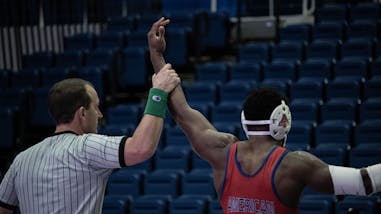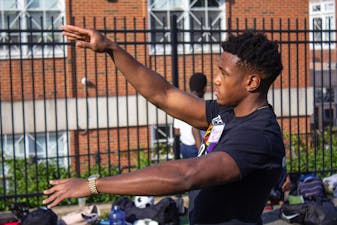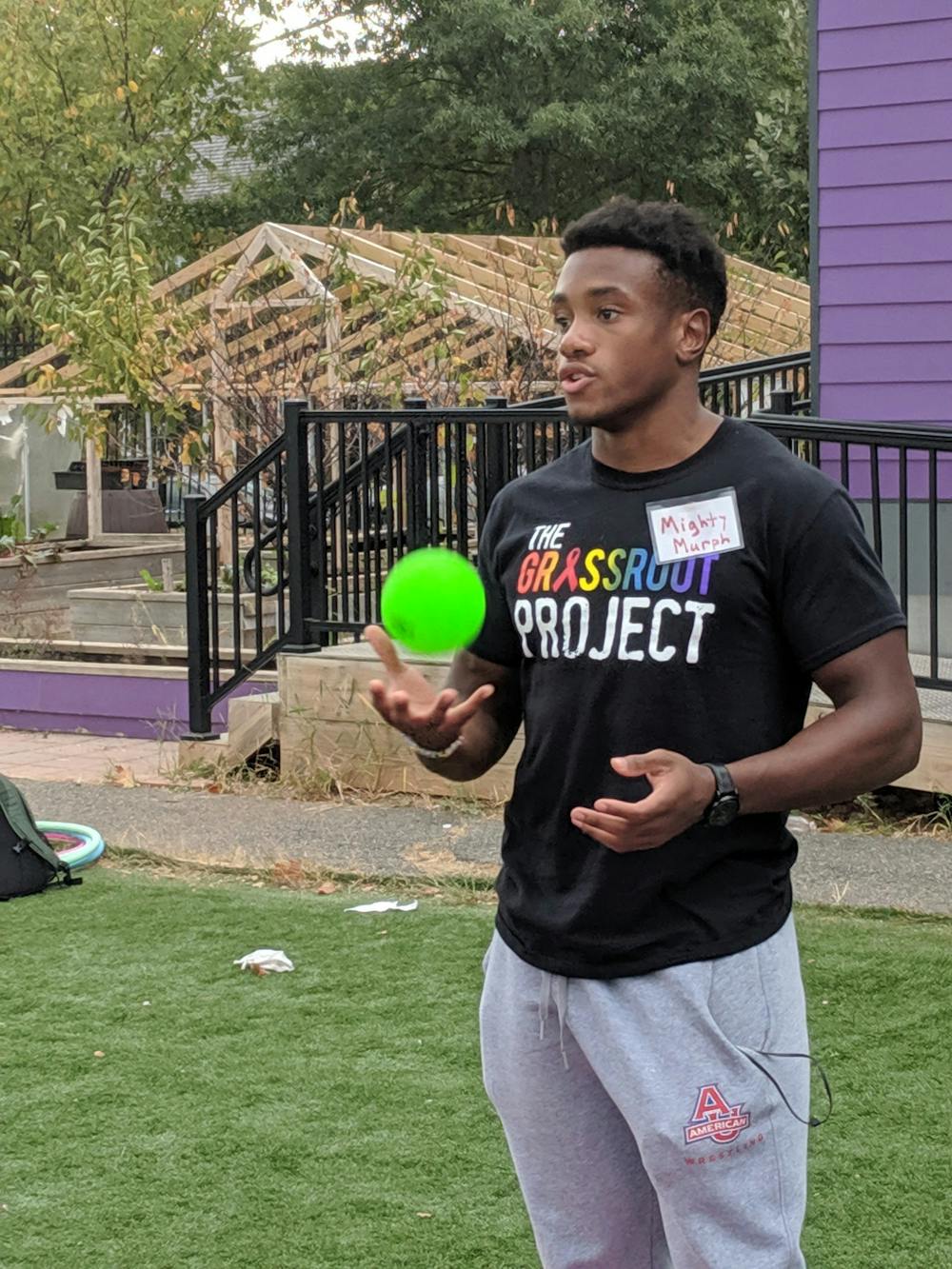Elijah Murphy hovers in the back of the gymnasium with a lump in his throat. He's at a training day for The Grassroot Project, a local nonprofit where D.C. student-athletes teach middle schoolers about sexual, nutritional and mental health through play-based learning.
Around him, student-athletes are running through a game of stress football, one which is, ironically, quite intense. Murphy, though, is a fly on the wall. It won’t be long before he’s in front of dozens of middle schoolers.
With kids that age, there are no holds barred — and working alongside unfamiliar student-athletes is a tough situation for the reserved senior to be in. So what on Earth is he doing here? And how would he end up front and center at the 2020 ESPYs, winning an award for his leadership?
A humble leader
It was a long journey between those two points in Murphy’s life.
“During training, he was very introverted,” Kaylah Clark, Howard University track and field thrower, said. “But that was a good thing. He listened before he spoke, and I think that's one of the beauties about his leadership style. Even if he was nervous to talk, he never let us see him sweat.”
In the fall of 2019, The Grassroot Project assigned Murphy to the Mary McLeod Bethune Day Academy in Northeast D.C., where he would help teach sixth graders about sexual health. He arrived at the school, shying away from any type of limelight, as usual. He wasn't especially proud of his performance as a teacher, or at least not enough to admit it.
But tucked away on the wall, out of nowhere, Murphy started connecting to the kids.
After a few minutes, one student came up to Murphy to talk about the lesson's key points. The two engaged in their own little world, away from the pack, backs to the other students. Once their time elapsed, the kid popped his head up, turned around and sported a big, braced smile. Then it happened again. And again. And again.
It was subtle, but it was enough to catch the eye of Jane Wallis, the director of programs at The Grassroot Project.
“After his first program, I saw how well he connected one-on-one with kids, and I told him he was going to be a head coach,” Wallis said. A head coach is a student-athlete that is picked to oversee all athletes and middle schoolers at a school. “I told him he’s got something special.”
“And he just looked at me and was like ‘No, don’t do that. Don’t put me in that role. I could never do that; I’m not a leader.’”
But that moment sparked a shift in Murphy, both in his persona and in his Grassroot name. At the organization, all student-athletes must give themselves a nickname to relate to the kids.
“During our training, I [originally] chose ‘Eli,’” Murphy said. “Eli was a very wack name. Not very creative.”
After some time at the school, he embraced a new name: “Mighty Murph.” That one stuck.
Racism, psychology and a mental health curriculum
If you want to talk to Murphy during the school year, you'll probably be out of luck. The wrestler is at school or work from 6 a.m. to 9 p.m., balancing academics, Division I wrestling, two campus jobs and, of course, his work at The Grassroot Project.
This past semester, Murphy finished his undergraduate degree and will pursue a Master’s degree in psychology this upcoming year. His ultimate goal is to earn a Ph.D. in clinical psychology.
He said his interest in psychology connects to most everything in his life: wrestling, volunteering, advocating and living as a Black man in America.

In wake of the police killings of Breonna Taylor, George Floyd and Rayshard Brooks, as well as the Black Lives Matter protests that followed, Murphy wanted to step up.
Over the past month, Murphy and Jahi Jones, a wrestler from the University of Maryland, have held several Instagram Live sessions, in which the two discussed their experiences as Black student-athletes participating in a predominantly white sport at predominantly white institutions.
The athletes examined systemic racism and the narrative around protests, among many other topics for which they could discuss personal experiences both in and out of the classroom.
For Murphy, the first Instagram Live session was a nerve-wracking experience, especially after all the promotion they had done for it. He asked himself why he, of all people, would have over 100 people listening to his opinions on race. But he ultimately felt it was necessary to share the things he’s learned, and how his education and studies in psychology tied in with his experiences as a Black man living in the DMV area.
“I come from Hyattsville, Maryland, pretty much born and raised,” Murphy said. “That community is majority Latino and African American, so coming to college was probably my first big experience being around so many people who didn’t look like me. So there were some things I had to learn and adapt to.”
“On campus, I would hear some things that were troubling that I didn’t really realize would be an issue,” Murphy continued. “Things like 'systemic racism isn't a thing.' Things like 'you aren't a slave, so why are you guys upset about slavery?'”
“I’ve also heard people ask if they can use the N-word,” Murphy added. "I've heard the N-word used several times by people who were white, I've heard it with a hard 'r' ... These were new experiences for me because I grew up around mostly non-white people.”
With his background in psychology, Murphy was well-equipped to work on the pilot program for The Grassroot Project’s mental health curriculum. While he downplayed his role, members of the project said that Murphy heavily shaped what was in the curriculum.
“We have 200 student-athletes who are very committed,” Wallis said. “But, no one did what Elijah did. When someone comes up to you and says, ‘I know my schedule is going to be packed in the fall. I'm trying to get through as many credits as I can. But, I am going to make time for this.’ That is a pretty powerful statement from a student-athlete.”
Mental health is often seen as a taboo topic, but it is an unspoken reality for many middle school students. When discussing the subject’s heavier topics, the ability to relate and be genuine is really special. In essence, Murphy was a perfect fit.
Part of his focus in the program has been integrating aspects of systemic racism education into a larger part of the mental health curriculum. Murphy was the lone athlete selected to help put finishing touches on the curriculum this summer after his immense influence during the pilot program.
One of his goals is to make conversations about racism more direct. He wishes that had been a bigger part of his education in middle school.
“I didn't really realize I lived through a lot of these things that are influenced by systemic racism until I got to college,” Murphy said. “I didn’t understand why things were the way they were. I just thought that this is how life was and that this is how life is for everybody.”
Engaging with students
Around October, Murphy realized that even though he didn’t have the loudest voice in the program, the kids benefited from his leadership. The stress began to ease off and he started to embrace the role, gaining confidence through the fall and spring semesters until he became a head coach in the fall of 2019.
It paid off.
According to Grassroot Project staff, if you talk to any of the kids or student-athletes, they’ll say the chance to work with Murphy is like winning the lottery.
“He's more of a lead by example type of guy,” Clark, who worked with Murphy this spring on the mental health curriculum, said. “He lets his actions speak louder than your words.”

His energy, however calm, has rubbed off on his fellow student-athletes.
Aubrey Benzing-Plourde, a rower at Georgetown, is one of those athletes. She said Murphy stood out especially strong in October 2019 in the midst of the midterm season. The student-athletes had history papers on their minds and could only focus so much on middle schoolers. Murphy, despite his congested schedule, was the exception.
“I saw him working with the other student-athletes turning in sexual health, and they're playing this game called cat and mouse,” Benzing-Plourde said. “And he was just smiling so big, and he was just so engaged and present, and he had so much energy.”
Benzing-Plourde said she wasn’t as engaged, but when she saw Murphy’s actions, she felt more capable of balancing athletics, academics and leadership.
“Being from this area, and being able to put myself in the students' shoes makes it very easy for me to relate to them, I keep it very personable,” Murphy said. “I just joke around with them as if I am another one of their peers.”
Once the coronavirus pandemic hit in March, though, Murphy was cut off from the eighth-graders at Perry Street Prep in Northeast D.C. While it isn’t the way he envisioned the semester ending, he’s been a presence on The Grassroot Project’s YouTube channel over the past few months, appearing in several videos to explain healthy coping strategies for the kids to use. Since the virus is so entwined with everyday life, the organization will incorporate new information about the pandemic's effect on mental health into its curriculum.
While they still don’t have concrete plans in the fall, they are working school-by-school to figure out the right action plan. Murphy, to the surprise of no one, will be back in eighth-grade classrooms as soon as he gets the green light.
“ESPY Award-Winner” Elijah Murphy
On June 21, Murphy was awarded the 2020 Billie Jean King Youth Leadership Award for his work at The Grassroot Project. He will receive a $10,000 academic scholarship or donation to the charity of his choice.
Over the next year, Murphy will receive mentoring from leaders in sports and attend programs and workshops for benefit in leadership. Depending on circumstances from the pandemic, he’ll also have the chance to meet King, the winner of 39 major tennis titles and a champion for equality in the United States.
Six other athletes received the award this year, including Howard University two-sport athlete Niah Woods, also a member of The Grassroot Project.
“You inspire us, you give us hope and you make us stronger,” King said of the award-winners.
Despite the work he’s done and the character he displays, Murphy was surprised that he was picked out of all Grassroot Project's athletes.
“We thought about who are the leaders that represent our organization, our ethos, people that have really great ideas that could be unlocked by these opportunities," Tyler Spencer, Grassroot Project founder, said.
According to Spencer, Murphy and Woods are unsung heroes because of their humility and hard work-ethic.
Murphy’s happy with the praise, but ultimately, he’s happiest about the progress he’s made and the work that he’s done.
“Just going from ‘Eli in the back’ to ‘Mighty Murph’ the head coach, revising the mental health curriculum and doing a mental health pilot in several programs’” Murphy said, pausing to gather his thoughts. “It just goes to show how much the organization has done for me.”





